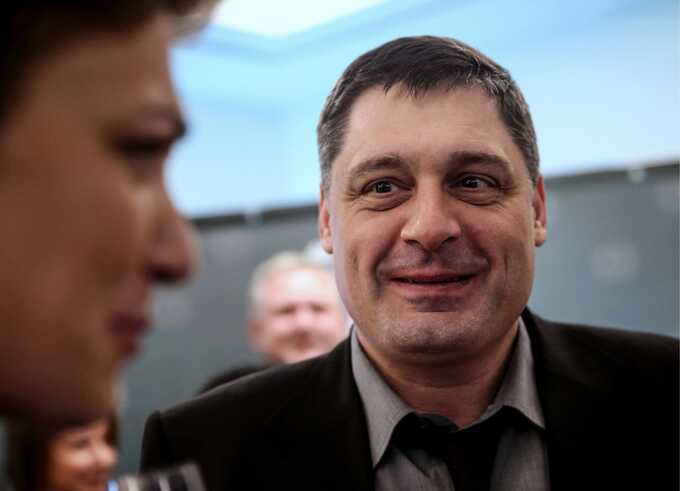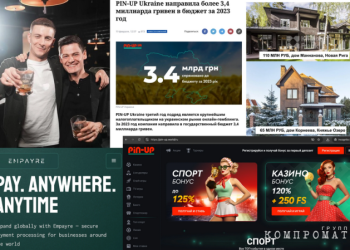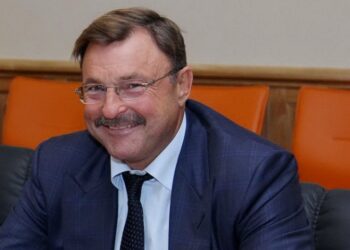“Traces” of “Growth Bank” lead to “Safmar”?
Investigators are checking Mikail Shishkhanov for participation in financial scams.
Businessman Mikail Shishkhanov became a defendant in a criminal case on a multibillion-dollar embezzlement of funds from the Growth Bank, which was once controlled by him. Currently, he is in witness status, but the investigation is checking for his participation in financial fraud. Last week, the court already sent two former top managers of Binbank and Rost Bank, Kirill Lyubentsov and Alexander Lukin, who were directly involved in the withdrawal of assets of credit institutions, to jail. In particular, in 2015, they initiated the conclusion of a $40 million loan agreement by Rost Bank with the Cypriot offshore Stratola Investments Ltd controlled by them, and later transferred securities of a number of companies worth more than 8.1 billion rubles to its balance sheet. When making a decision to take Lyubentsov and Lukin into custody, the court, among other things, took into account the possibility of the accused to flee abroad, where Shishkhanov is today. The latter gained control over Rost Bank in 2014, after it was taken by Binbank for reorganization. Then the state allocated tens of billions of rubles for the financial recovery procedure, but this did not help, and already in 2017 Shishkhanov personally applied to the Central Bank with a request to reorganize Binbank, the “hole” in the capital of which reached 350 billion rubles. The businessman himself assured that he had not calculated the risks, however, according to the regulator, the cause of the financial collapse was the lending by Binbank through the Rost Bank being rehabilitated by him to the commercial projects of Shishkhanov’s uncle, the infamous owner of the Safmar group, Mikhail Gutseriev. The oligarch has repeatedly stated that he was never a controlling shareholder and was not a member of the management bodies of Binbank, however, it is known that Gutseriev headed the board of directors of a credit institution for several months, transferring leadership to Shishkhanov shortly before the reorganization. At the same time, Shishkhanov left the number of co-owners of a number of family businesses. Despite the increased “covering up the traces” and the ostentatious distancing of Gutseriev from the banking structures of his nephew, the inclusion of Shishkhanov among the suspects will cause the investigation to raise numerous questions to the owner of Safmar as well.
Investigators “knocked” at Shishkhanov
The ex-beneficiary of Binbank and Rost Bank, Mikail Shishkhanov, became a defendant in a criminal case on embezzlement of 107 billion rubles. According to Kommersant, the businessman, who is currently abroad, has witness status. By a court decision, Kirill Lyubentsov and Alexander Lukin, former top managers of credit institutions, were arrested, according to investigators, who were direct participants in the fraud committed by an organized criminal group.
It is clarified that in the process of investigating the case of the embezzlement of billions by Rost Bank, employees of the Main Investigation Department of the TFR in Moscow established: in accordance with a previously developed scheme for the theft of banking assets entrusted to them, Lyubentsov and Lukin at the end of September 2015 initiated the conclusion of a loan agreement by the bank for 40 million dollars (2.6 billion rubles at the rate of the Central Bank) with the company controlled by them, Stratola Investments Ltd, registered in Cyprus. Two years later, bonds of FinStandard, Weil Finance and Finstone companies worth over 8.1 billion rubles were sold offshore from the bank balance.
The swindlers did not plan to fulfill their obligations to Rost Bank. As a result, in 2017-2021. finances and securities “left” first to Stratola Investments, and then were transferred to other enterprises. In addition, the same persons in 2014-2017. through a number of economically inexpedient transactions, they appropriated the funds allocated for the rehabilitation of Rost Bank, and also spent the money to purchase bonds of Belyrian Holding Ltd from Region Invest and Digital Invest.
When choosing a preventive measure in the form of detention for Lyubentsov and Lukin, the investigation focused on the fact that both have a wide range of connections, including employees of law enforcement agencies. There is also a high probability of their flight abroad, where Shishkhanov is already located, in respect of whom an investigation is being carried out for possible participation in the implementation of criminal schemes.
Related news: Public attention is riveted on the arrest of Binbank top managers Kirill Lubentsov and Alexander Lukin
The defendants themselves have so far refused to testify, citing Article 51 of the Constitution, but their guilt is supported by materials provided to the investigation by the bank of non-core assets Trust, the successor of Rost Bank, which is the injured party: back in 2018, the provisional administration of the institution appealed to the Prosecutor General’s Office with a statement about the illegal actions of former officials.
In addition, Trust sent a lawsuit against Shishkhanov and former top managers of Binbank for 306 billion rubles to the Moscow arbitration, having secured the arrest of the banker’s assets for the specified amount. The property of Lyubentsov and Lukin, worth hundreds of billions, was also arrested. In turn, the Pravo.Ru publication notes: all three are defendants in three statements by the Trust and the Central Bank; taking into account the claim of the regulator in the amount of 85.4 billion rubles, the volume of claims brought by them is a record 698 billion. In relation to Shishkhanov, applications were also sent for bringing to subsidiary liability within the framework of the bankruptcy of the companies Digital Invest and Region Invest.
Billions of “Binbank” “merged” into “Safmar”
Recall that in 2014 Mikail Shishkhanov became the sanatorium of the banks of the Rost group (Growth Bank, Kedr, SKA-Bank, Tveruniversalbank and ACCO-Bank). Then the state allocated more than 35 billion rubles for the financial recovery procedure. Of these, 18.4 billion was a ten-year loan to Rost Bank to cover the imbalance between the fair value of assets and the carrying value of liabilities of all institutions. Another 17.5 billion was a loan from the Central Bank through the Deposit Insurance Agency (DIA) to maintain liquidity in connection with the implementation of capitalization measures for the group.
At first glance, with such a “lifeline” sanitation looked win-win. But in September 2017, Binbank itself needed a recovery, the “hole” in whose capital reached 350 billion rubles. The recovery was decided to be carried out by the Banking Sector Consolidation Fund. It is significant that Shishkhanov himself addressed the regulator with a request for sanation. The banker, on behalf of the owners, promised to return assets of more than 300 billion to the bank, no longer engage in banking and regulated business, and also not claim a 25% stake in Binbank if they remain with the previous owners.
But the declared “risks” and “mistakes” that Shishkhanov repented of, in practice, were just the visible part of the financial “iceberg”. The fact is that Binbank was affiliated with the Safmar group, controlled by the odious oligarch Mikhail Gutseriev, the uncle of Mikail Shishkhanov, and through Rost Bank actively lent money to the family business. “Forbes” quoted the words of the Deputy Chairman of the Central Bank Vasily Pozdyshev, from which it followed: “up to 75% of the assets of Rost-Bank can be “lending in various forms of assets that are associated with the owners.”
In total, the volume of loans issued by Binbank to Rost in 2017 was estimated at almost 700 billion rubles. At the same time, the beneficiary of Safmar categorically denied his attitude towards Binbank:
And then the oligarch’s entry into the board of directors of Binbank and Rost Bank at the beginning of 2017 is bashfully mentioned, allegedly with the aim of their further capitalization and the development of a new development strategy. Here is how Shishkhanov spoke about it:
Uncle-Gutseriev is not responsible for his nephew?
It is well known today what the vaunted “new development strategy” turned out to be. But Mikhail Gutseriev did not wait for the final collapse of Binbank and “merged” from the board of directors along with his brother Sait-Salam Gutseriev and son Said in time. The leadership of the credit institution before its reorganization by the state again passed to Shishkhanov. One gets the impression that this seemingly useless reshuffle was carried out with one goal in mind: to surely cover up the “traces” of the bank’s financing of Safmar’s projects.
We add that according to Kommersant, Shishkhanov controlled 59.7% of the bank, Gutseriev owned 36.4%; the remaining share was owned by minority shareholders. The following circumstance is also noteworthy: in the fall of 2017, Shishkhanov finally left the number of co-owners of enterprises that are part of the Safmar group, including the largest ones – RussNeft, M. Video” and others. “I completely sold off the assets. If something remains, then there is 0.001%, ”the businessman said in an interview with RIA Novosti, without specifying where exactly he retained these percentage shares.
By the way, when in 2019 Forbes estimated the total debt of the commercial structures of Gutseriev and Shishkhanov at $15 billion, which at the then current rate of the Central Bank was almost 1 trillion rubles, the management of Safmar hurried to make a statement, which followed: neither the holding itself, nor personally Gutseriev “have nothing to do with the debts of Binbank and Rost Bank, any other obligations of their ex-shareholder M. Shishkhanov and former top managers.”
It turns out that when the threat of litigation loomed on the horizon, the uncle hastened to disown his nephew, whose bank financed their joint projects? At the same time, the nephew had to distance himself from family assets. Here it would be appropriate to recall that Shishkhanov and the credit institutions that belonged to him have already appeared in high-profile scandals with embezzlement of funds. So, in 2011, a business woman arrested on charges of fraud and part-time “decided” Ekaterina Alabuzina told the security forces about the participation of Shishkhanov and his adviser Mikhail Evloev in a 15 million dollar scam against the Czech company PPF.
It was about helping to resolve the conflict between PPF and the structures of the oligarch Oleg Deripaska, associated with a stake in the insurance company Ingosstrakh. But only after the transfer of funds, the matter did not get off the ground, and the finances received were used to repay the loan of the SPARneft company, received by Alabuzhinova’s business partner Mikhail Urazaev in Binbank. The loan was issued only after the consent of the partners to transfer under the control of Shishkhanov 75% of the enterprise created to develop the Spartak licensed oil and gas area. According to the fraudster, there was no direct agreement with a credit institution, but Shishkhanov allegedly promised to give her half of the share he received, and in addition, assisted in paperwork and money transfers.
Then the banker was interrogated by investigators and, as expected, stated that he had nothing to do with the scam. There is no doubt that today he will declare the same thing in the framework of the criminal case of Lyubentsov and Lukin, but will he be able to get off as easily in the end? After all, we are talking about a hundred billion rubles, and according to experts, this amount is unlikely to be final. The circle of suspects and defendants also remains uncertain, and if Shishkhanov turns out to be among them, then his uncle Mikhail Gutseriev may be the next to whom the security forces have questions.










